Healthcare Mobile App Development: Step-by-Step Guide
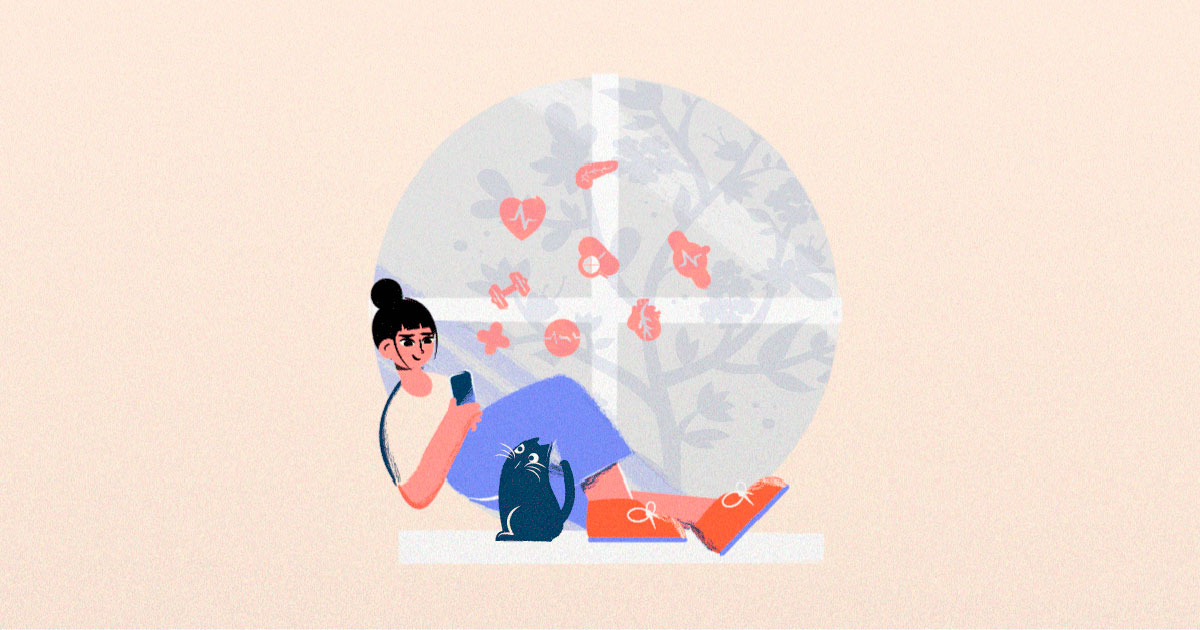
Are you thinking of investing in healthcare mobile app development?
You are on the right path, as the market of mHealth apps is predicted to grow in leaps and bounds.
Smart technologies, high-tech solutions, and automation globally touched all industries. Still, the changes are more prominent and life-changing in the healthcare sector, transforming all processes, from administrative to diagnostics and treatment. We can live without entertainment, but health is still more important. You can never be out-of-pocket by investing in mobile health, and you are in the right place to start.
Before getting deep into the industry, here is statistical data to know.
According to Fortune Business Insights, the global mHealth apps market size is projected to grow from $80.87 billion in 2023 to $861.40 billion by 2030, at a CAGR of 40.2% during the forecast period.
If you invest in medical software development, you can bite off a part of this lucrative multi-billion pie. This article will help you learn how to turn your ideas into a successful business. This long-read article will get you through the main points of the mobile healthcare industry:
- The most trending types of mobile healthcare apps
- Addevice’s expertise in healthcare mobile app development
- Step-by-step process of medical app development
- Basic and flagship features to include in a healthcare app
- Technical aspects of healthcare app development
- How to protect your app from failure
- Key regulations for healthcare application development
- Medical software app development services
Let’s dive into business and technical details!
Main Types of Healthcare Mobile Apps
If we try to group all available health-related mobile apps, they will be categorized into professional and personal healthcare apps. Let’s learn which apps belong to each category and how to offer value for end-users.
Apps for Healthcare Professionals
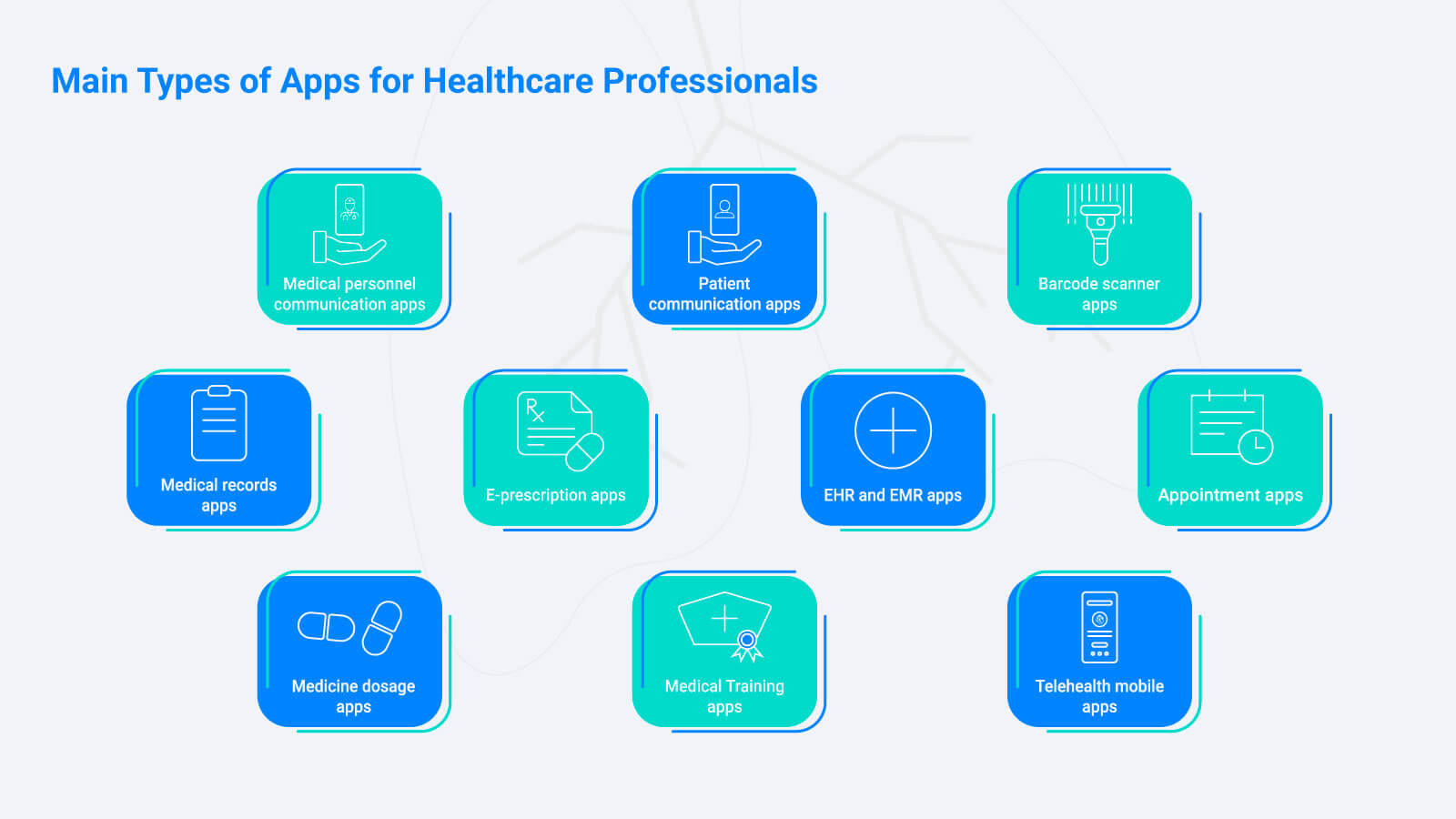
As the name entails, this category is dedicated to apps for healthcare professionals. They aim to simplify the work of medical professionals and streamline operations within clinics.
Applications of this group are designed to improve communication between medical personnel. Such healthcare apps usually support text and voice messaging, file sharing and act as the access point to electronic health records. Overall, the use of such apps aims to streamline the decision-making process.
Such apps are very important for medical centers striving to build loyal relationships with patients. Communication apps allow sharing information about medical conditions with a patient’s relatives, photos, medical records, and timely updates.
- Medical records apps
Records are critical in medical services; at the same time, they remain the most time-consuming administrative process. With modern technologies, the power of machine learning, and automation, medical records are automatized and kept in the cloud, being available anytime needed. Mobile records applications are designed to help medical personnel update patients’ information, and the collected data can be used for further treatments and adjustments.
- Barcode scanner apps
The main goal of such health management apps is to help hospitals spend less on expensive barcode scanners. Medical personnel can scan such barcodes with their smartphones and access the needed information within seconds.
- Medicine dosage apps
Calculating the medicine dosage for each patient based on age, weight, and overall medical conditions can be tedious. Healthcare mobile apps can simplify the task and automatically calculate data based on stored patients’ data. It is possible to move further with such apps and enable them to predict the incompatibility of medicine.
- E-prescription apps
The mobile healthcare app can easily simplify life for doctors, patients, and pharmacies. Such applications allow doctors to prescribe medicine, check its availability, and send prescriptions to pharmacies. Patients can choose the pharmacies to order online and deliver medicine to the doors.
- EHR and EMR apps
Electronic health records (EHR) and electronic medical records (EMR) help doctors get information about patients for further use during treatment. A robust app can revolve around such apps and provide doctors with fast and secure access to the results of examinations and laboratory tests, medical scans, etc.
- Appointment apps
A similar app is used by patients to make appointments with their doctors and doctors who schedule meetings, manage working hours, see the upcoming consultations, and more. By syncing data from the doctor’s calendar with patients' data, the app helps avoid overlaps and conflicts in schedules.
- Medical training apps
Self-development is key to success and improvement, especially for medical personnel. Medical training apps will become a must for skill and knowledge development for anyone who wants to be aware of the latest research, news in the healthcare industry innovations, and more.
- Telehealth mobile apps
The global pandemic changed the situation in the telemedicine segment and app development. American Medical Association issued research stating that from February 2020, telehealth apps have grown by 100% and will reach the peak of popularity in the following months.
Such apps allow patients to visit doctors without leaving their homes. They can easily book a consultation with doctors and visit them online with a single application.
Healthcare Mobile Apps for Patients
Healthcare mobile app development is beneficial not only for medical workers but also for patients. They get access to a simplified process of dealing with medical instances, which is the main disadvantage of medicine in many countries.
- Telemedicine or doctor-on-demand apps
As we mentioned, such apps are on the rise. With their help, patients can visit doctors regardless of their location, even from across the globe. The best part about using telemedicine apps is consulting with the best doctors and getting the most qualified medical help anywhere and anytime.
- Urgent care apps
Such healthcare mobile apps for patients can be beneficial in urgent situations. Usually, they operate like a directory of the nearest hospitals, available doctors, automatic route planning, and time estimation to get to the nearest hospitals.
- Diagnosis app
Patients love googling their medical symptoms. So why not help them with the task by providing applications with carefully collected data on different medical conditions and symptoms? You can integrate additional features that allow you to get an appointment with a doctor based on symptoms.
- Monitoring apps
The monitoring application is probably the most complex of all types that require the newest technologies and tech stack. Applications are integrated with EHR systems and wearable devices that monitor patients’ medical conditions and notify hospitals about dangerous situations threatening patients’ lives. Such applications are very useful for people with chronic diseases.
- Anxiety apps
Anxiety is a mental illness threatening the lives of millions. There are over 50 million adults with anxiety disorders in the USA alone. The healthcare app can help such patients by offering the best practices to clear their minds, calm down, release stress, and start thinking positively.
- Dieting apps
If we talk about the most popular personal healthcare apps, nutrition and dieting apps lead the game. They are crucial for people who want to lose weight and eat healthily. Such apps usually provide information about food and may advise on how to stay healthy and fit. They can also have calorie counting, progress chat, history of meals, etc.
- Women's health apps
Health application of this type is designed to help track women’s health. The apps generally combine a calendar of periods, pregnancy monitoring, weight tracking, breastfeeding, and even online consultations and doctor appointments.
There are dozens of more health-related, less popular categories and dozens more to come in the future. One of them can become your successful project.
Addevice's Experience in Healthcare App Development
If you decide to pursue the idea of healthcare mobile app development, you need to find a company that will help you bring your app to life. Working with amateurs or those that don’t have expertise in the niche might not be the best solution. You need a vendor that will become your reliable technical partner and bring extensive experience to the table.
Addevice knows the insides of healthcare app development and has a few successfully developed projects.
Enlive Dental is a platform designed for dental hospital management. The main task of this solution is to eliminate the need for physical documents, as the data is collected and processed inside the platform. Medical workers and patients can access information inside the app instantly.
The integration of image processing algorithms is responsible for automatic text recognition on docs uploaded to the app.
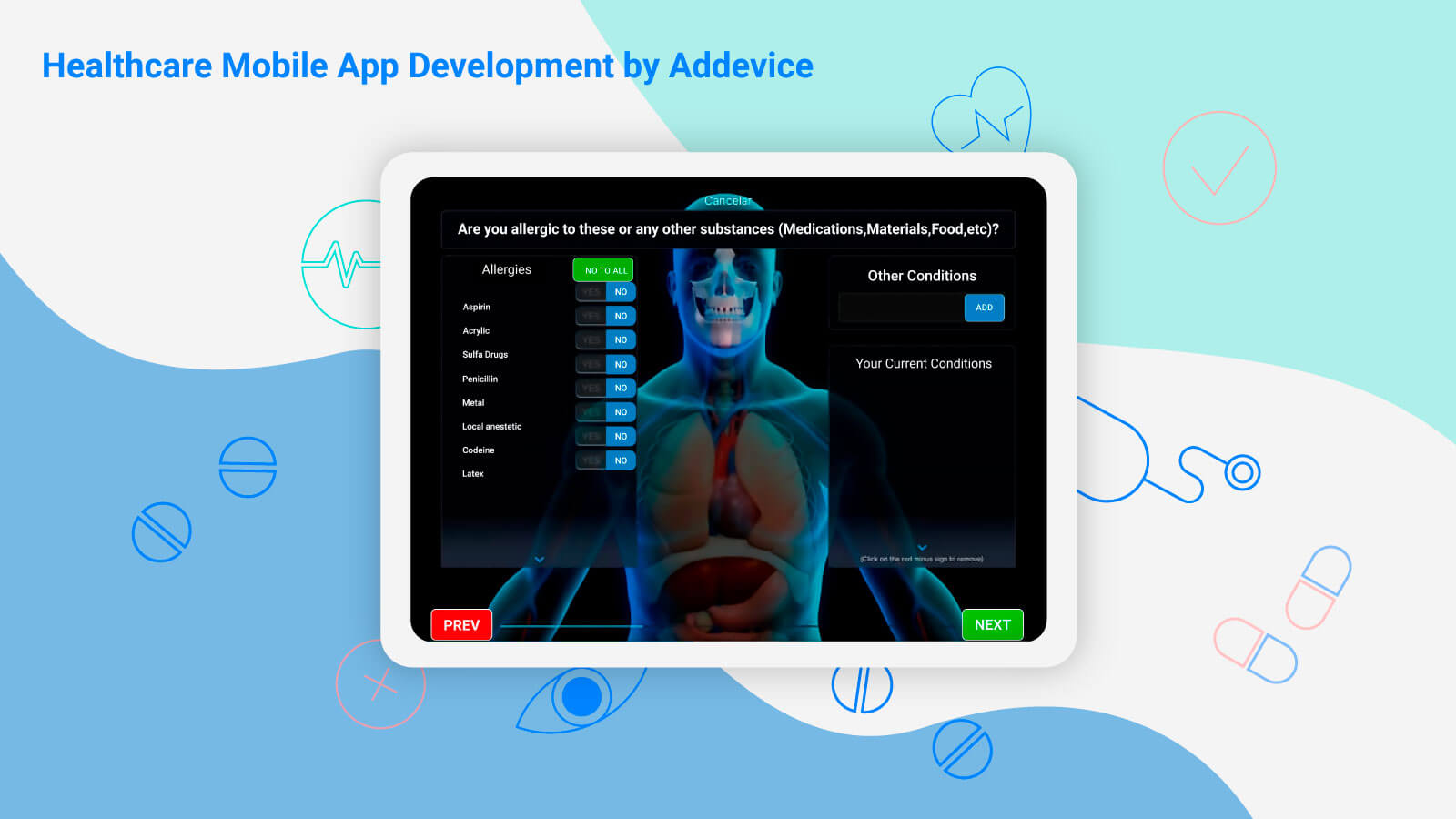
Another example of successful healthcare mobile app development by Addevice is Alertive. This mHealth application uses the combination of artificial intelligence and the Internet of Things technology to collect and process information from thermometers, glucometers, and other medical monitoring devices to help patients with hypertension react to drastic changes in vital signs without delay. Alertive is designed to save lives by predicting threatening health conditions.
Alertive Healthcare solution assists patients and doctors to track health vitals via the connected and FDA-approved wearables. This allows for better health treatment and prevention of potential health issues.
Alertive Health offers a mobile solution for subscribed healthcare professionals. This powerful product collects information in a safe and secure way. The data is analyzed and turned into a conclusion with the necessary set of actions.
The created IoT-enabled system assists Alertive Health with improved healthcare services and the Remote Management platform gives the plan for personalized treatments for each particular patient.
How do you Create a Healthcare App?
Medical software development is a complex process consisting of different steps. You can create a mobile medical app in 7 steps:
1. Define the type of healthcare app
You cannot start healthcare mobile app development without first deciding what type of app you will create. The choice depends on the business perspectives, how the app will be monetized, and your vision.
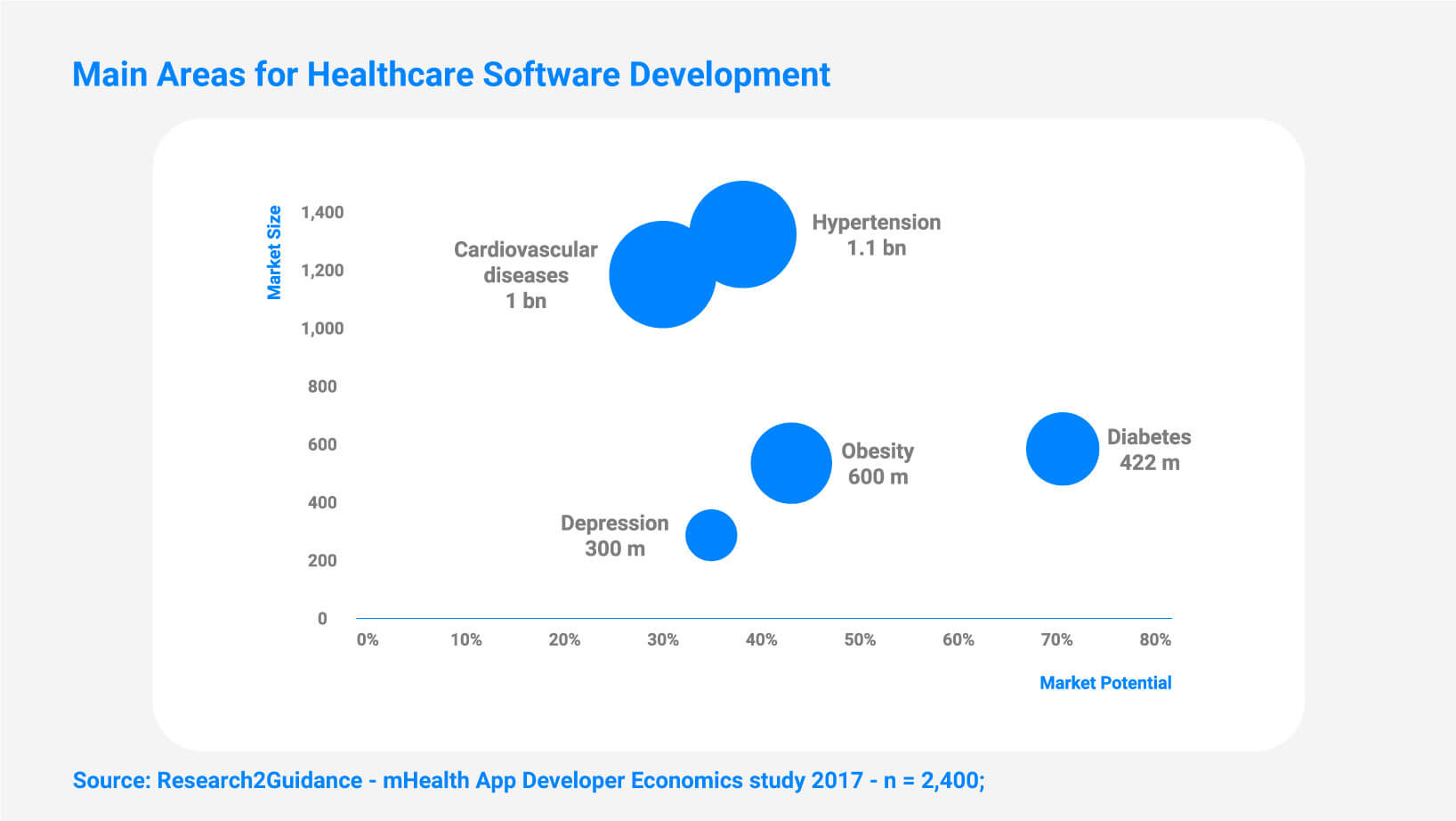
The above graph shows the most promising healthcare mobile app development therapy fields. If you decide to build an app that solves the problems of diabetes, obesity, and depression, it will have the highest chance of success.
2. Conduct market research
Once you have chosen the application type, you can now conduct comprehensive market research and competitor analysis. This step can be divided into various subtasks during which you identify your future competitors, analyze their applications, and find the main strong and weak points. You also need to understand your future target audience and know their pains. Make a list of the basic and additional features to be included in your healthcare apps.
3. Come up with the best UX and UI design
The design of the application is the most critical component in project development. It takes three seconds for users to understand whether they like the application or not. Your app should be simple, practical, and attractive to capture users at the very first moment of interaction. As for mHealth applications, they should be maximum user-friendly with easy navigation and perfect UX. If you work with experienced professionals, you won’t need to worry about this part.
4. Define your monetization strategy
Depending on the type of mHealth app you are creating, you need to build a strategy that will allow your app to generate money. You can utilize a few strategies to make revenue.
5. Create the first version of your product
Start healthcare mobile app development by developing an MVP with a basic set of features. The main task here is to get an application that will help you test your idea. Also, the first version development might be limited to a single platform, iOS or Android.
6. Test and get feedback
The deployment of MVP is crucial to gathering feedback. First, user acceptance testing (UAT) will reveal all the weak points. Such solutions as Mixpanel, Appsee, and Localytics will help you track user behavior and identify how they use your app. You can also ask them for their opinion and create questionnaires to understand what they think about your application.
7. Analyze data and plan for improvements
Healthcare mobile app development is an ongoing process where you constantly iterate your app and launch new features. Based on the collected data during the previous stage, you need to plan further app improvements. Identify which features might lack and how you can improve customer experience and start developing the next version of your healthcare software project.
Core Features for Healthcare Applications
Healthcare app development entirely depends on the type of app you want to create and the features will include.
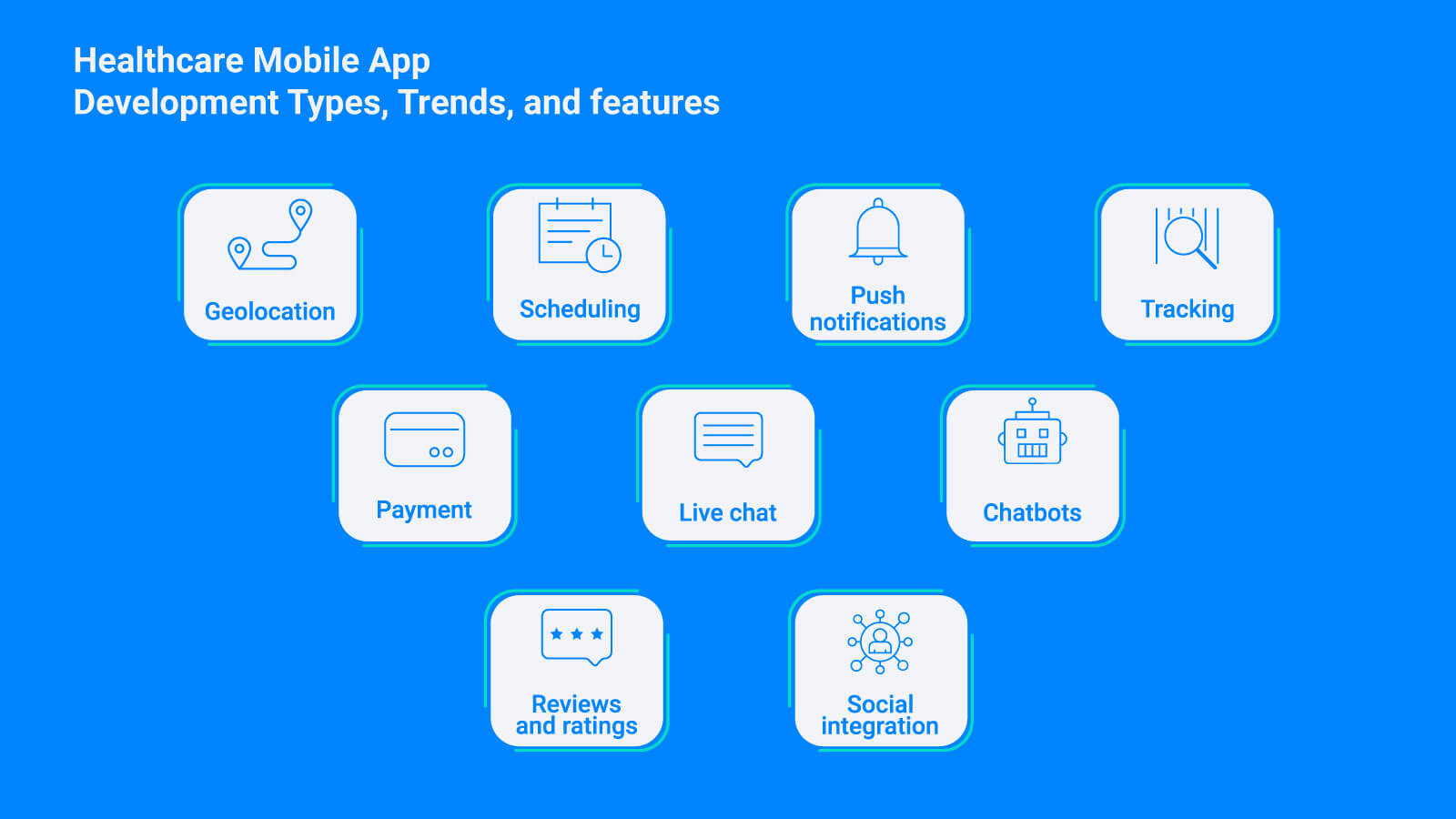
Let’s investigate some basic features for healthcare applications.
- Geolocation – this feature helps patients find the closest hospitals, doctors, and pharmacies. The functionality is built with the help of Apple Maps, Google Maps, or any other map APIs that you integrate within your app.
- Scheduling – allow patients to book doctor appointments right in your app. Integration with the doctors’ calendars allows users and doctors to manage their schedules better. This feature can also be used to help patients make their schedules for taking medications, water consumption, etc.
- Push notifications – the feature is used to notify users about changes in applications or remind them about scheduled doctor visits, time to take medicine, etc.
- Tracking– applications with this functionality help doctors monitor patients and get data on lab results, medical tests, etc.
- Payment – online payment integration allows customers to pay for services through the app. Such integration can include PayPal, credit cards, Apple, and Google Pay.
- Live chat – allows doctors and patients to communicate with built-in real-live chat. This feature will help build loyalty to your app and the relationship between end-users and doctors based on trust.
- Chatbots – a chatbot is a robust tool to keep patients connected to the app and get instant support. They aim to reduce manual work required to provide patients with timely responses, look up information on doctors and hospitals, and help them schedule appointments with doctors.
- Reviews and ratings – consider including this feature in healthcare mobile app development, especially if your solution helps patients find doctors. Help them make the best choice for their health and choose doctors based on positive reviews and ratings.
- Social integration is a nice-to-have but optional feature for the app since it involves using third-party services. Some users might feel uncertain about sharing access to their medical profiles with third parties; that’s why you should clearly describe this point in your privacy policy. Either way, if you decide to go on with this feature, provide users with multiple options, including Google, Facebook, and Twitter, as they are the most popular.
Depending on the purpose of healthcare mobile app development, you might consider adding advanced features. The development company you choose for the task should consult you on the best set of features that you can include.
Key Trends in Healthcare App Development
Turning healthcare mobile app development into a successful app is not a simple task. You need to utilize all available solutions to stand out and provide value to customers. Aside from robust features, you might need to consider using additional innovative solutions.
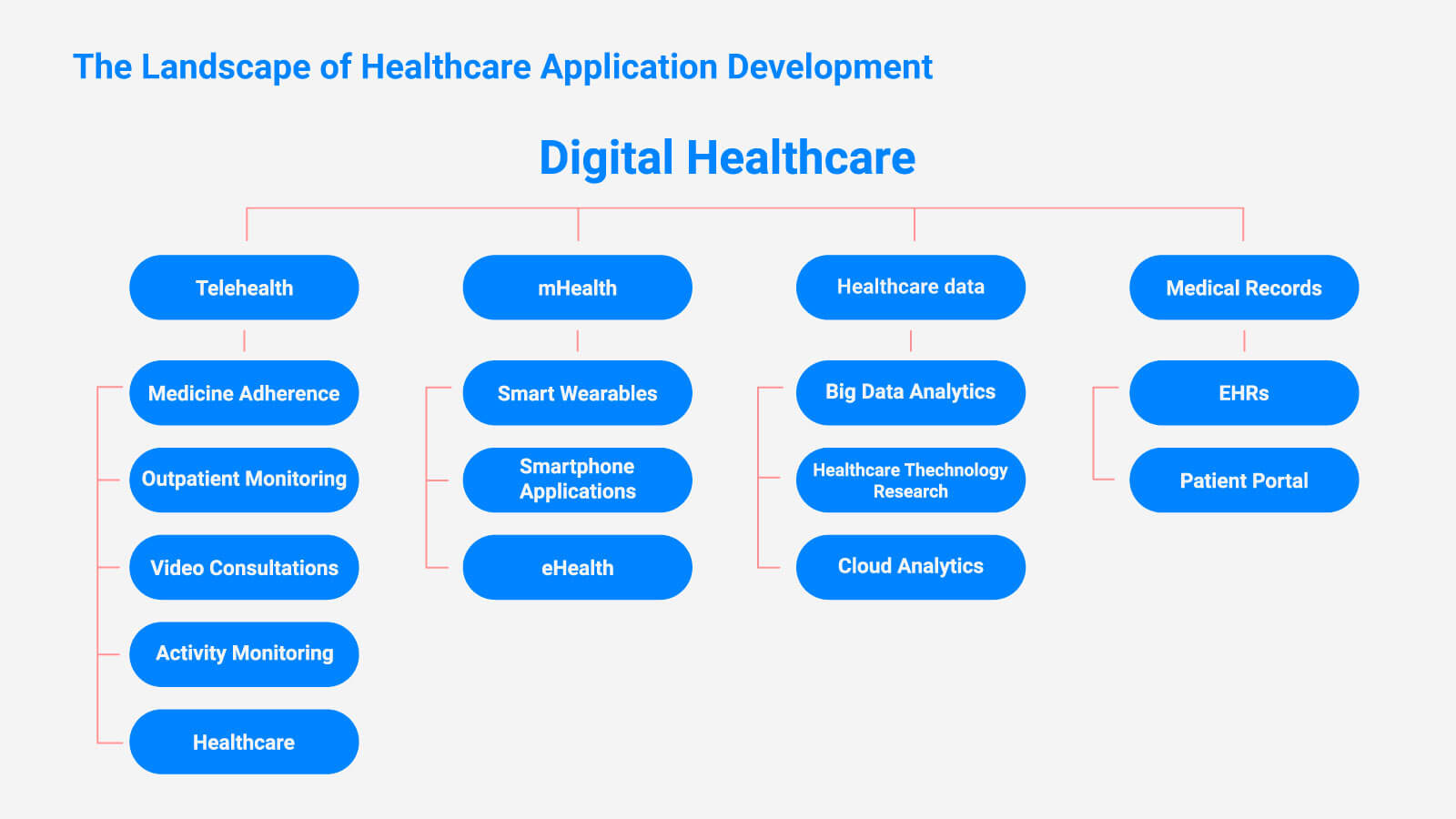
- Blockchain
This technology can bring real value to mobile healthcare apps. Blockchain is tamperproof, i.e., once added, data cannot be updated without the whole blockchain knowing about it. The Healthcare industry, prone to data regulations and security, can utilize this technology to store sensitive medical information, prevent fraud by registering medicine, and much more.
- Artificial intelligence
AI in medical software development is a requirement today. Many applications heavily rely on its AI technology, with Alertive, developed by Addevice, being a great example. AI technology collects patient information and data on symptoms to make predictions and diagnose patients’ conditions. Such predictions are nearing the point of 100% accuracy.
- Virtual reality
VR is a powerful solution that can revolutionize the healthcare industry. It can be used for educational purposes to help doctors investigate new treatments, show patients procedures or their health condition, or help patients overcome depression and anxiety. The use cases for VR are immense.
- Internet of Things (IoT)
IoT is an integral part of healthcare mobile app development. This powerful technology can provide insights into the patients’ health, help monitor medical conditions and identify life-threatening ones with the help of wearables and monitors.
- 3D educative videos
3D videos are used for educational purposes by medical professionals and patients. They would be able to see the impact of diseases on the human body, how treatment influences the progress of a disease, and much more.
- Telemedicine
The global telemedicine market size is predicted to reach 175,5 billion by 2026. Such solutions are already gaining traction, and their growth will only escalate in the future.
- Big Data & Analytics
The medical industry has access to a huge data providing valuable insights. Big Data combined with a robust analytics system and machine learning can help predict patients’ flow, predict possible diagnoses, the results of medical trials, etc.
- Integrated payments
Mobile payments are an essential part of healthcare mobile app development. The adoption of mobile devices makes it possible to pay for medical services at any time with the help of a smartphone. Consider including mobile payments into your mHealth apps if you care about patients’ comfort.
Summing up everything said above, you might need to include some of the above technologies in healthcare app development. Your future application should address the most pressing pain points that patients have, so based on the project scope think of those technologies to be included in the app.
Technical Considerations of Healthcare Application Development
Your application can be integrated with third-party technologies, services, and APIs. Their use will streamline healthcare mobile app development and provide access to valuable healthcare data.
1. Box API
This API is designed to help companies organize content management in custom applications. This technology can be used in healthcare mobile app development to manage patients’ records, share data inside a hospital, and work with data. This API is fully HIPAA compliant; that’s why you won’t have any problems with its use.
2. Human API
The main purpose of this API is to streamline the process of working schedule management inside a hospital. This technology works on REST architecture and allows to organize data about all employees, their positions, schedules, etc.
3. TrueVault API
This API should be included in healthcare mobile app development as it enables HIPAA-compliant information storage for healthcare applications. Information stored with this API is secure and protected from any forms of data breaches. Experienced app developers can access it via REST calls.
4. DrChrono API
It is a robust API offering to integrate patient care platform, check-in functionality, and electronic medical billing with medical applications. The use of DrChrono API is free of charge.
5. BlueEHR
This API is a powerful tool in mhealth. You can make an app that will work with EHR and EMR in a customized way. The API offers other solutions for revenue cycle management, inventory tracking, e-prescriptions, etc.
6. Apple HealthKit API & SDK
How do you create a healthcare app for iOS? Here is your answer. Apple HealthKit is designed for mhealth and can be used for free.
7. Google Healthcare SDK & API
Google provides developers with a range of tools that help to develop applications. Medical applications for Android can use Google Fit SDK and Cloud Healthcare API. These APIs are designed for healthcare mobile app development and have in-depth documentation on using them.
8. Doximity
This API provides information about doctors and the places where they work. The API aims to connect medical professionals with patients.
When you build a health application, you can also create your own healthcare API and make it available to other companies. Such APIs are on the rise today, especially with the COVID-19 outbreak. If you decide to create an app that shows coronavirus-related information, you can find a lot of already available medical APIs.
Key Reasons Why Health Applications Fail
Even if you invest millions in healthcare mobile app development, there is still a chance that your application will fail. Here are a few reasons why such apps don’t succeed:
- Poor UX design that interferes with seamless user experience
- Failure to comply with local regulations and lows
- Lack of knowledge in medical software development
- Developing an app without an end goal
- An app that doesn’t meet the needs of medical workers and patients
Before launching your app, check it for having the above problems. If you spot that something doesn’t feel right about your application, make sure to tackle the problem before moving it to the market.
Regulations for Medical Software Development
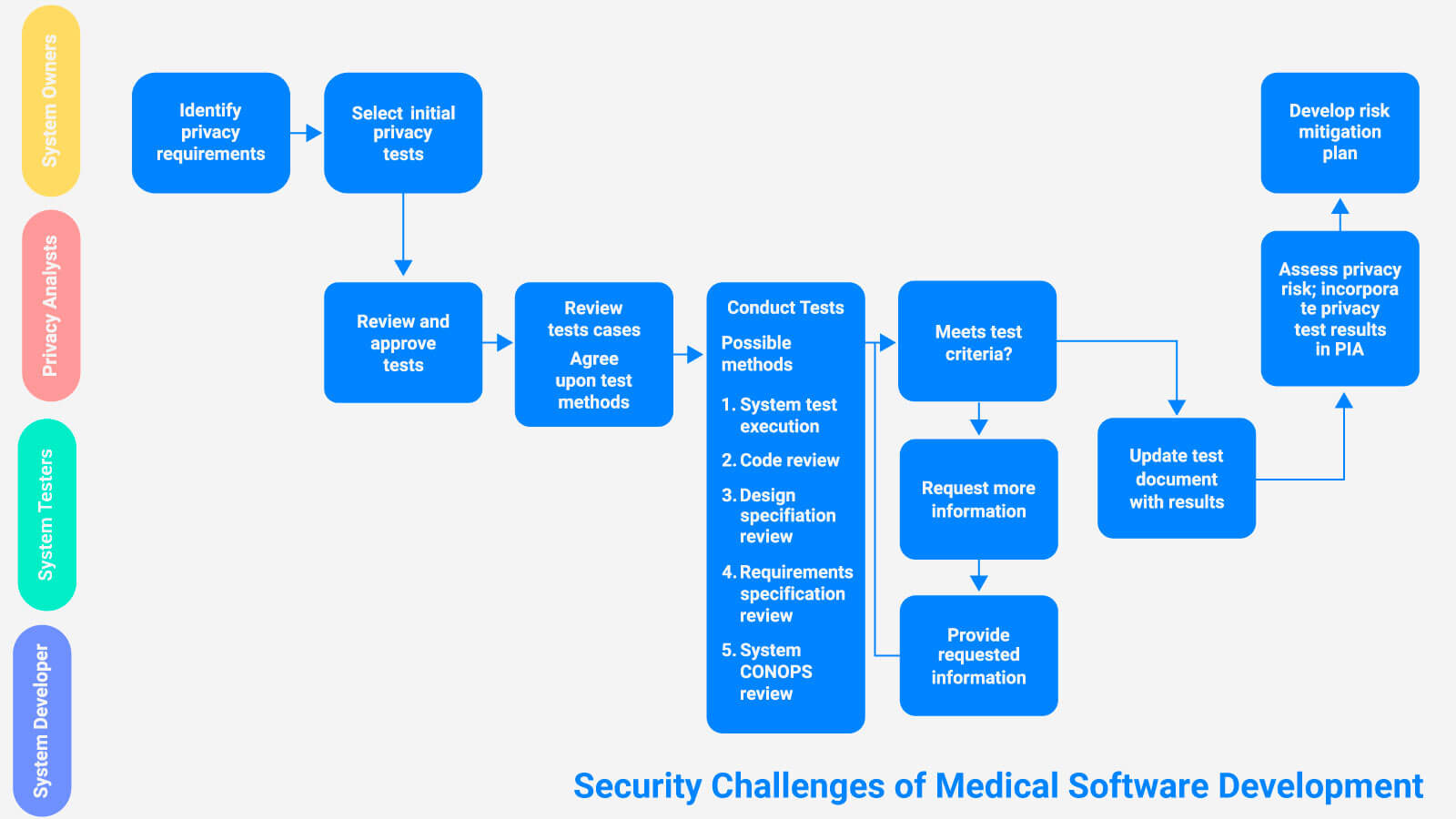
The healthcare industry is a very lucrative sphere for hackers as it processes and stores valuable data. This information can be used for various malicious purposes, from stealing money from bank accounts to dangerous identity thefts.
Countries have their regulations and medical software development standards that the mHealth application should comply with. If you fail to comply with them, your application will be banned, and it can even entail costly penalties.
Let’s check the main regulations and how you can approach them in healthcare app development.
The USA
HIPAA
Health insurance portability and accountability act is the first and foremost regulation to follow during healthcare mobile app development. This act regulates how companies should guarantee the security of patients’ data and how it should be stored and transmitted between devices. There is even a HIPAA Security Rule Toolkit that you can use during medical software development to ensure the abidance of the regulation.
HITECH Act
The Health Information Technology for Economic and Clinical Health Act (HITECH Act) was created to cover all the loopholes present in HIPAA regulations regarding the management and work with healthcare records.
As of 2013, the two acts were united into a single regulation document, meaning that your app must meet all the requirements of the latest HIPAA rules. If it does, your app is considered to be also compliant with the HITECH Act.
CCPA
California Consumer Privacy Act (CCPA), also called the US GDPR as it has the same requirements. Under this legislation, every person has the right to know why an app collects data, give consent for data collection, ask for a full report on all collected data, and require to delete all the collected information.
NIST
Compliance with the US National Institute of Standards and Technology (NIST) regulation is also a must for healthcare mobile app development in the USA. NIST’s rules and standards aim to regulate the management of healthcare data.
The European Union
GDPR
General Data Protection Regulation (GDPR) changed the lives of all companies operating in Europe. This regulation requires apps to provide customers with information on why they collect information, how they store and protect information. Users must also have the option to decline the collection of certain types of data and require to delete all collected data with an in-depth report on which data had been collected and which was erased.
NIS
The Network and Information Security Directive is another legislation you should investigate before healthcare mobile app development. This directive provides security measures for different industries, including healthcare, energy, financial market, etc.
The United Kingdom
Despite Brexit, companies dealing with healthcare software development should also be compliant with GDPR. Additionally, all applications must comply with the Data Protection Act, first issued in 1988.
Canada
When it comes to Canada, you don’t need to comply with multiple regulations when it comes to Canada. The main document is the Personal Information Protection and Electronic Documents Act (PIPEDA), which is common with GDPR.
Important: If you want to create a mHealth app for Alberta, Quebec, and British Columbia, provinces have their own regulations, which are different from PIPEDA. Make sure to study them before healthcare mobile app development.
International Standards - ISO
ISO International Standards are an impressive set of criteria for assessing business and technology, which today is used by all players in the world market as a reference basis for standardization.
Key Services in Healthcare Mobile App Development
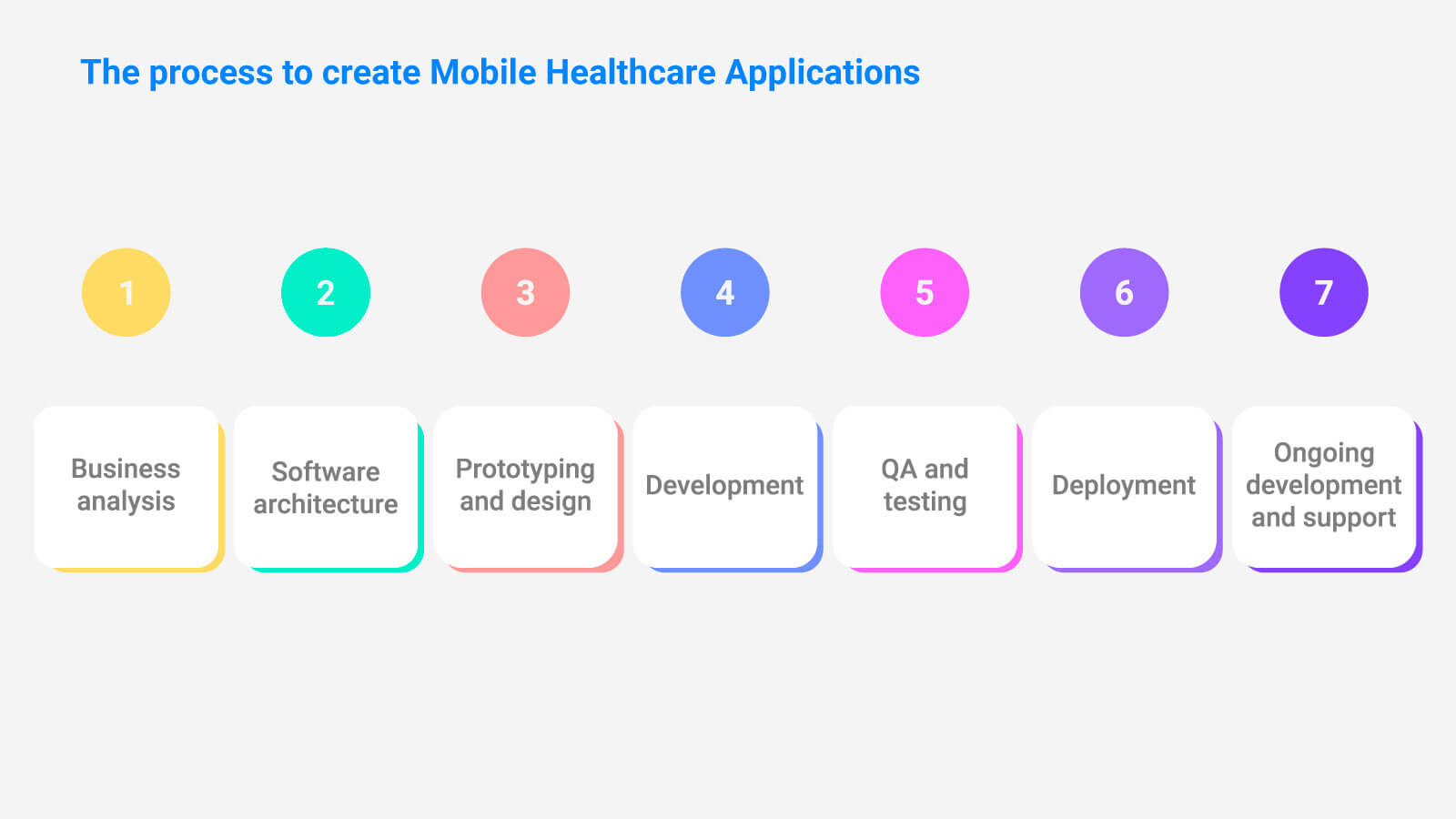
What are the best practices to follow during mHealth app development?
Healthcare mobile app development is complex, consisting of different stages and steps. Below you can find information on how we approach medical software development at Addevice.
1. Business analysis
It is the first step of app development. Our business analysts will study your app idea and identify how it aligns with your business needs during this stage. The main goal is to create a comprehensive project plan covering a detailed timeline and app development costs.
2. Software architecture
After a full understanding of the project and all needed features, our software architects conduct research on identifying the main technologies for your application, integrating your app with third-party APIs, regulations that you need to follow, and much more.
3. Prototyping and design
In the next stage, designers create the wireframe of your app’s interface and create prototypes. We prepare a few possible solutions and present them to our clients. After sharing feedback, designers implement all necessary changes and repeat the process if you have any other comments.
After the UX is finalized, designers create the UI of your application.
4. Development
During healthcare mobile app development, our team of developers creates an app with the defined requirements and design. At the end of this step, you will have a product created based on your specifications.
5. QA and testing
To ensure the quality of software, it should be thoroughly tested. Our in-house QA engineers work in line with software engineers, testing and debugging the functionality, not losing even a second.
6. Deployment
After final improvements and testing, your software product is ready to enter the market. We help you publish your products in necessary app stores and make them accessible to users worldwide.
7. Ongoing development and support
The deployment is only the start of a long journey. You need to constantly monitor user behavior with in-app analytics tools to identify the most popular features and those that users have problems with. The app gets updates, new features, and bug fixes based on the collected data.
Healthcare mobile app development is an ongoing process that can take years of gradual improvements and even whole app redesigns.
Why It Is Worth Investing in Healthcare Mobile App Development
Benefits of mHealth apps:
- Improved efficiency of medical personnel
- Automatization of key processes
- Reduction of time on manual work
- Access to the best doctors from anywhere in the world
- Reduced expenses on hospitals maintenance
- Higher productivity of personnel
- Timely notification about appointments
- Easy communication between doctors and patients
- Access to educational materials and shared medical knowledge
- Fast and high-accuracy diagnostics
Read also The Role of Ai in Healthcare.
Mobile Technology in the Healthcare Industry, healthcare in mobile, medical mobile apps, medical apps development, Healthcare Applications, Medical Personnel, Apps for Clinics, Foldable Devices, Uber App Development Cost
Develop Your Mobile Health App
Transform healthcare experiences with your own mobile health app
Our Expertise Covers:
✅ Telemedicine and virtual consultations
✅ Electronic health records integration
✅ Medication tracking and health monitoring features
Table of contents
FAQ
The future of the mHealth app market seems very promising. According to Fortune Business Insights , the market was estimated at $38.89 billion in 2020 and is predicted to grow to $314.60 billion by 2028 at a remarkable CAGR of 34,8%.
During healthcare mobile app development, you might need to use various technologies and third-party APIs. For Android development, you will need to utilize Google Fit SDK and Cloud Healthcare API. IOS mHealth development usually uses Apple HealthKit.
There are a lot of monetization strategies that you can use in your mHealth app to generate revenue. Possible options include different types of in-app advertisements, in-app purchases, subscriptions, and commissions for consultations or appointments.
mHealth (mobile health) usually applies to smartphones and wearable devices in medical care. Such applications can be used to educate users, provide information about doctors and their practices, help track health conditions, chronic diseases, and much more. The most popular mHealth apps are solutions for weight loss, exercise, women’s health, sleep and meditation, and pregnancy.
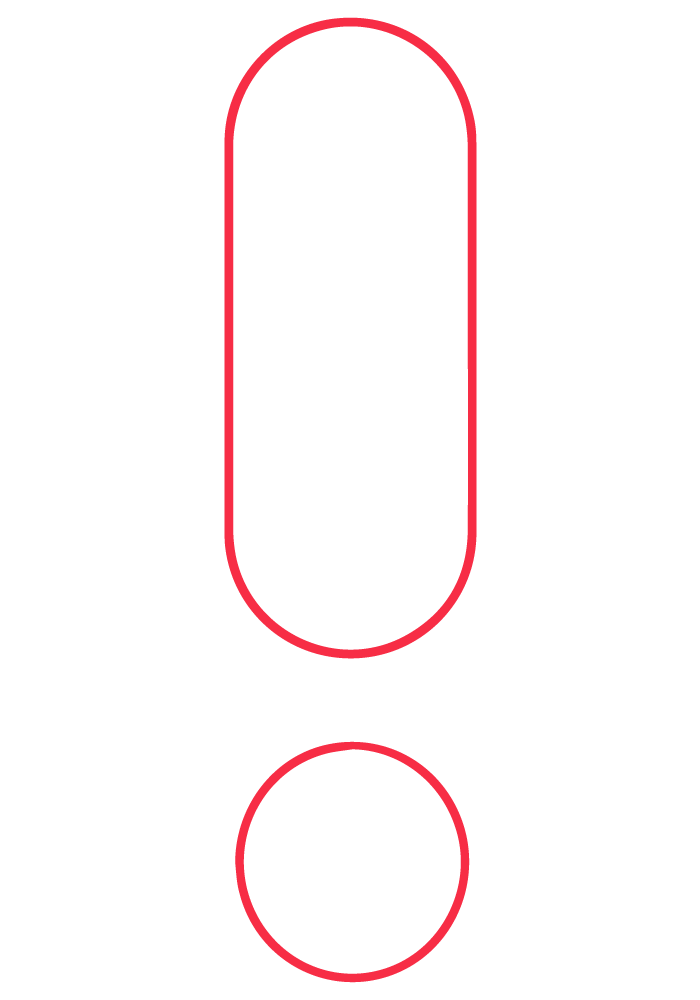
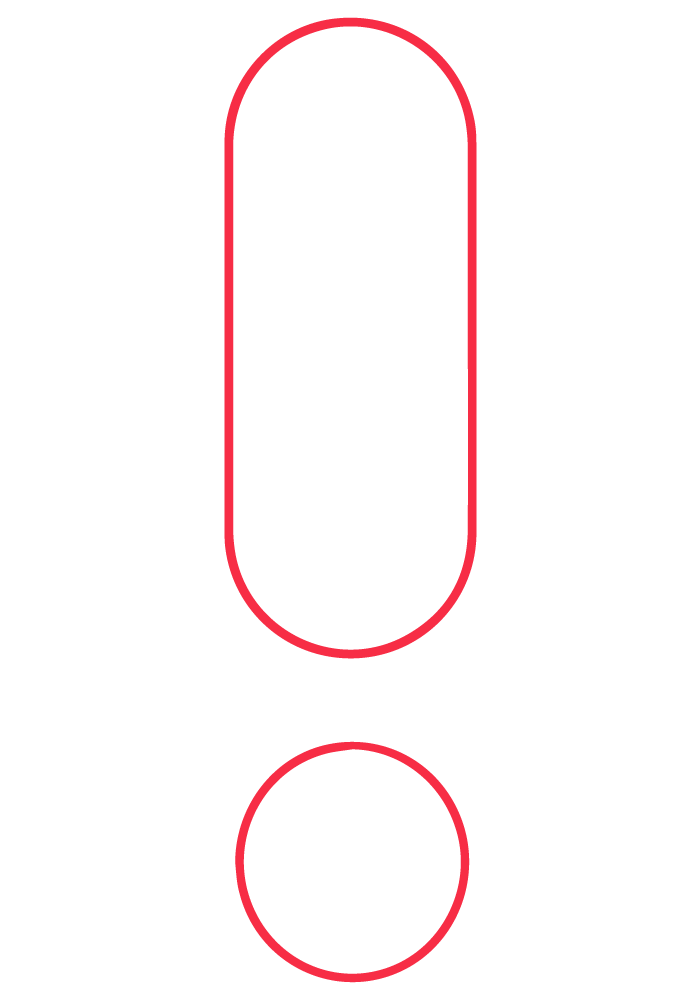
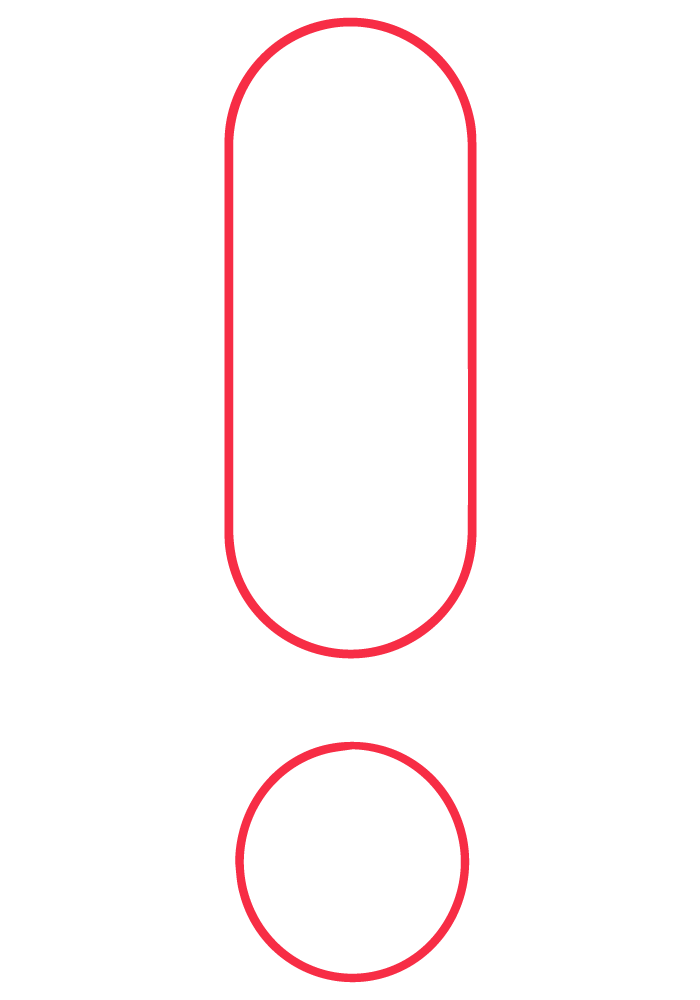
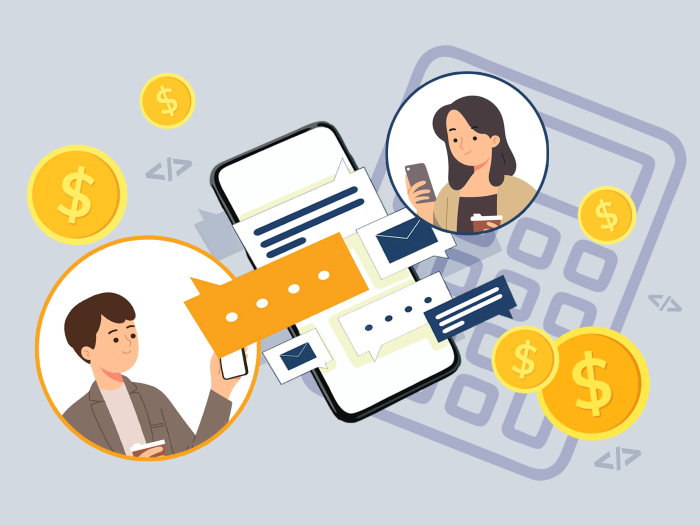 How Much Does It Cost to Build a Messaging App?
How Much Does It Cost to Build a Messaging App?
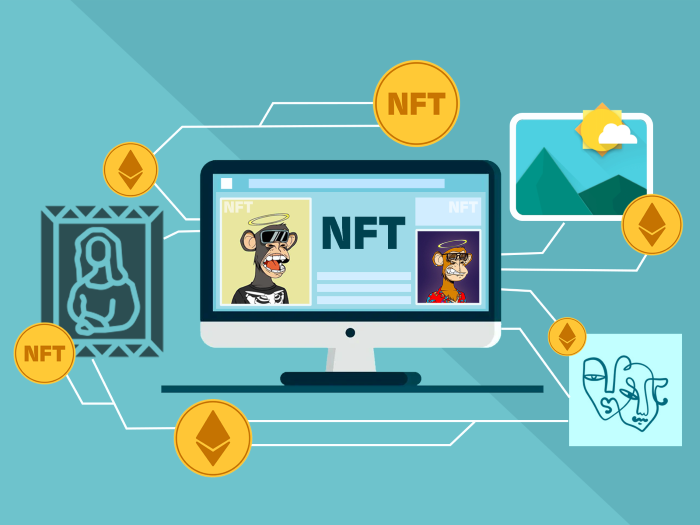 How to Create an NFT Marketplace: Development Guide
How to Create an NFT Marketplace: Development Guide
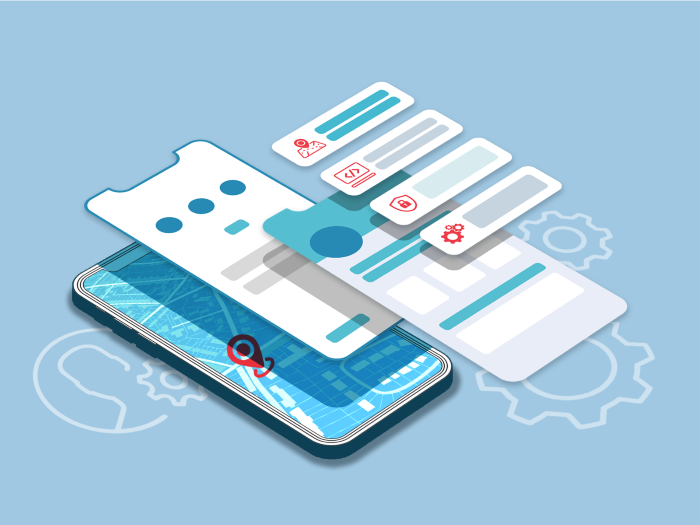 Must-Have Uber App Features: Building a Ridesharing App
Must-Have Uber App Features: Building a Ridesharing App